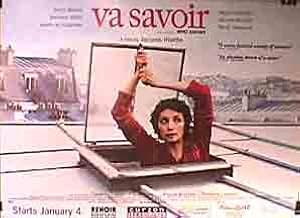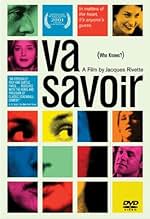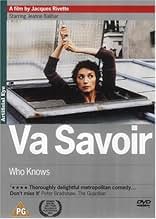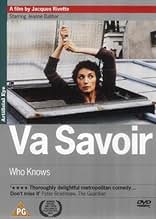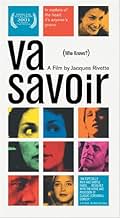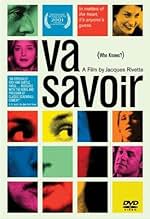VALUTAZIONE IMDb
6,8/10
2615
LA TUA VALUTAZIONE
Aggiungi una trama nella tua linguaQuick-witted, well-read cultured types revolve around each other in a delightful potpourri of theatre, romanticism and theft.Quick-witted, well-read cultured types revolve around each other in a delightful potpourri of theatre, romanticism and theft.Quick-witted, well-read cultured types revolve around each other in a delightful potpourri of theatre, romanticism and theft.
- Regia
- Sceneggiatura
- Star
- Premi
- 3 vittorie e 3 candidature totali
Valeria Cavalli
- Ines
- (as Valéria Cavalli)
Recensioni in evidenza
I felt I should like this film more than I did. It is set in current day Paris where a theatre troupe is putting on a Italian production. The story revolves around a French actress in the troupe who is married to the director of the theatre group who is returning to Paris for the first time in years and still has unresolved feelings for an ex who resides in the city. The acting is solid if not very good, and the plot does hold interest and hangs together well. Having said this I could not help but feel the whole thing was somewhat slight and the payoff in time (it is or seemed like a very long movie) was somewhat unjustified. In some ways the characters seemed almost distant to me, they were real but I couldnt get inside their head, which in some ways is a silly criticism because life is like that and that is not necessarily a detraction for the film but I felt as though they were drifting through a series of set pieces with not all that much at stake. Having said this it is definitely worth a look and certainly should be sought if you enjoy cinema that goes beyond the pedestrian plot lines and pyrotechnics of all too many mainstream features today.
I was bored to death by this movie. The main character is a self-centered and selfish actress whose problems failed to interest me. I stayed with it for an hour, and walked away; my wife said it became somewhat better toward the end. If all drama must be divided into comedy and tragedy, then in that sense this is a comedy. However, when movie reviewers call a movie a comedy, I think we are entitled to believe they mean it is funny. Tastes differ, and I accept that some might find this movie interesting, but by no stretch of the imagination could anyone in his right mind call it "funny." I wouldn't have rented this video except for a quotation on the box, in which A. O. Scott of The New York Times wrote, "An especially rich and subtle farce . . . resolved with the verve and precision of classic screwball comedy."
A light Rivette; Va Savoir (2001) is a film that features many of the director's most recognisable traits and characteristics familiar from the unwieldy and progressive films that he made in the late 1960's and early 1970's, but done in such a way as to suggest a more frivolous or throwaway tone with the emphasis placed more squarely on the elements of comedy and farce. This doesn't necessarily mean that the film is bad, or that it fails in some way to compare to the more iconic likes of Paris nous appartient (1960), L'amour fou (1969), Out 1 (1971) and Celine and Julie Go Boating (1974) - all of which are referenced here - but rather, that it shows a process of simplification; with Rivette taking his chosen themes - such as performance, miscommunication and the battle of the sexes - and allowing the characters to take precedence over the story, as opposed to the experiments with the film-making form. Perhaps this is emblematic of Rivette's more recent work over the last twenty years, though having only seen La Belle Noiseuse (1991) from his post Celine and Julie projects (admittedly missing out on a great deal of the man's career), I can only make the obvious comparisons.
Nonetheless, the relative simplicity and emphasis on character worked well here; with Rivette keenly following the trials and tribulations of a small collection of characters all bumbling about the woes of modern relationship difficulties from an upper-middle class perspective. Along the way we have the usual self-reflexive comments on the nature of performance and of film-making itself, with the story revolving around an Italian-language production of Luigi Pirandello's "As You Desire Me" that the central couple are appearing in. In some respects the film reminded me of the work of Woody Allen, with the ensemble nature of the narrative and the film's social milieu suggesting elements of Hannah and her Sisters (1986), Husbands and Wives (1994) and the more recent Melinda and Melinda (2004), while the idea of a play (or film) that is both a part of the story and also a subtle comment on it reminded me of Stardust Memories (1980), The Purple Rose of Cairo (1984) and Bullets Over Broadway (1994). As with those particular films, Va Savoir offers a narrative in which the subtle juxtaposition of the characters thoughts, feelings and social interactions creates a comedy of errors to undercut many of the more dramatic or self-consciously self-reflexive elements of the film.
As ever with Rivette - or at least the work of his that I've so far seen - the film moves perfectly between the various characters and their roles and interactions, as the skillful sense of choreography between the different layers of the narrative and the impeccable comic-performances of the cast help to draw us in to the story and lead us towards that quietly brilliant final act. I can certainly understand why many would dislike the film; it's long, deals exclusively in character interaction (on at least two separate levels) and creates a world that is stuffy and intellectual, no doubt seemingly horribly pretentious to those unwilling to spend more than thirty minutes with these characters or the world that Rivette creates. Regardless, I personally think that Va Savoir is a fine film; both intelligent and entertaining and with that spark and spirit so recognisable in the director's work from Paris nous appartient to the celebrated Celine and Julie.
Nonetheless, the relative simplicity and emphasis on character worked well here; with Rivette keenly following the trials and tribulations of a small collection of characters all bumbling about the woes of modern relationship difficulties from an upper-middle class perspective. Along the way we have the usual self-reflexive comments on the nature of performance and of film-making itself, with the story revolving around an Italian-language production of Luigi Pirandello's "As You Desire Me" that the central couple are appearing in. In some respects the film reminded me of the work of Woody Allen, with the ensemble nature of the narrative and the film's social milieu suggesting elements of Hannah and her Sisters (1986), Husbands and Wives (1994) and the more recent Melinda and Melinda (2004), while the idea of a play (or film) that is both a part of the story and also a subtle comment on it reminded me of Stardust Memories (1980), The Purple Rose of Cairo (1984) and Bullets Over Broadway (1994). As with those particular films, Va Savoir offers a narrative in which the subtle juxtaposition of the characters thoughts, feelings and social interactions creates a comedy of errors to undercut many of the more dramatic or self-consciously self-reflexive elements of the film.
As ever with Rivette - or at least the work of his that I've so far seen - the film moves perfectly between the various characters and their roles and interactions, as the skillful sense of choreography between the different layers of the narrative and the impeccable comic-performances of the cast help to draw us in to the story and lead us towards that quietly brilliant final act. I can certainly understand why many would dislike the film; it's long, deals exclusively in character interaction (on at least two separate levels) and creates a world that is stuffy and intellectual, no doubt seemingly horribly pretentious to those unwilling to spend more than thirty minutes with these characters or the world that Rivette creates. Regardless, I personally think that Va Savoir is a fine film; both intelligent and entertaining and with that spark and spirit so recognisable in the director's work from Paris nous appartient to the celebrated Celine and Julie.
The film's heroine, Camille, a French stage actress left Paris three years ago and found success in Torino, Italy where she became a lead actress for the theater company. She also became a lover of Ugo, a famous stage director. She returns back to Paris with Ugo and his company to act in Italian as a main character in Pirandello's "As You Desire Me", the play that explores the mysteries of identity and memory. While in Paris, Camille confronts her past life and Pierre, the man whom she loved and still can't forget. I found Camille's character (as played by Jeanne Balibar, the stage actress and a dancer) very interesting. She may not be likable in a beginning but she is talented and every character in the movie after watching her performing at the stage leaves with the feelings that they've witnessed something very special. Camille changes as the movie progresses and in the end she becomes like a sister or close friend to both Celine and Julie. Her every movement, gesture, the way she walks, smiles, turns her head, speaks in two languages changing the timbre of her voice are true marvels to watch and to listen to.
Ugo tries to find in the Paris libraries the lost but existing play by the Italian dramatist of 18th century, Carlo Goldoni and is helped by an intelligent and beautiful young student, Dominique or Do and they both seem to have developed some special feelings for each other. Dominique has a half-brother, Arthur who is in love with Sonja, a new woman in Pierre's life or is he in love with Sonja's exquisite jewelry? Do and Arthur have a mother, Madame Desprez who has inherited the library of the rare and priceless old books but she does not sell them, she keeps them as a memory of her first husband. Sonja, Pierre's girlfriend seems to bring the peace and happiness in Pierre's life after Camille was gone but she, too, had a mystery in her rather wild past for which a marvelous ring, an object of Arthur's desire serves as a reminder.
I like "Va savoir" a lot - it is so well constructed and absolutely Rivettesque and it made me smile all the time. It is long (as usual for Rivette's films) but elegantly relaxed. It moves well with its own wonderful pace and we enjoy leisure walkings and spend time with many old and rare books. We feel longing that is in the air - all six characters desire something and someone. We notice once again how much Rivette likes his characters sitting on the park bench where the magic events begin happening to them. We go through many wonderful sequences, ironic, dramatic, and lyrical and in the end we are awarded by the finale which is truly grand and theatrical in the best sense. After all the movie could be viewed as Rivette's love letter to theater. Va Savoir? Who knows?
Ugo tries to find in the Paris libraries the lost but existing play by the Italian dramatist of 18th century, Carlo Goldoni and is helped by an intelligent and beautiful young student, Dominique or Do and they both seem to have developed some special feelings for each other. Dominique has a half-brother, Arthur who is in love with Sonja, a new woman in Pierre's life or is he in love with Sonja's exquisite jewelry? Do and Arthur have a mother, Madame Desprez who has inherited the library of the rare and priceless old books but she does not sell them, she keeps them as a memory of her first husband. Sonja, Pierre's girlfriend seems to bring the peace and happiness in Pierre's life after Camille was gone but she, too, had a mystery in her rather wild past for which a marvelous ring, an object of Arthur's desire serves as a reminder.
I like "Va savoir" a lot - it is so well constructed and absolutely Rivettesque and it made me smile all the time. It is long (as usual for Rivette's films) but elegantly relaxed. It moves well with its own wonderful pace and we enjoy leisure walkings and spend time with many old and rare books. We feel longing that is in the air - all six characters desire something and someone. We notice once again how much Rivette likes his characters sitting on the park bench where the magic events begin happening to them. We go through many wonderful sequences, ironic, dramatic, and lyrical and in the end we are awarded by the finale which is truly grand and theatrical in the best sense. After all the movie could be viewed as Rivette's love letter to theater. Va Savoir? Who knows?
The play within a play ploy is used in Go Figure to excellent effect. The play is an eighteenth century farce performed by an Italian acting troupe visiting Paris. The farce utilizes six characters, the optimal number to engage in romantic mix-ups, flirtations, and other amorous stuff. And lo and behold, Go Figure itself contains six persons who engage in romantic mix-ups, flirtations, and crimes, both physical and of the heart.
There's the lead actress and her stage manager husband; she, who walked out on her now married ex-lover, whom she meets for the first time in three years (as well as his wife). Rounding out the six are two siblings, one a sexy young lady, the other her caddish older brother. There's jewel theft, a hunt for a missing manuscript, jealousy, and the falling in and out of love. And in the backdrop the acting troupe struggles to remains solvent.
All this is served up in, what I would call a French style. Of course I've not seen that many French romantic comedies, but I can state that were this in the hands of an American 'Hollywood' director it would be an entirely different film. And probably not nearly as good. In Rivette's hands all the action and interactions seem natural and light. There's no 'look at me' style of acting; it's almost understated. And this makes for a very enjoyable viewing that loses little on the small screen.
There's the lead actress and her stage manager husband; she, who walked out on her now married ex-lover, whom she meets for the first time in three years (as well as his wife). Rounding out the six are two siblings, one a sexy young lady, the other her caddish older brother. There's jewel theft, a hunt for a missing manuscript, jealousy, and the falling in and out of love. And in the backdrop the acting troupe struggles to remains solvent.
All this is served up in, what I would call a French style. Of course I've not seen that many French romantic comedies, but I can state that were this in the hands of an American 'Hollywood' director it would be an entirely different film. And probably not nearly as good. In Rivette's hands all the action and interactions seem natural and light. There's no 'look at me' style of acting; it's almost understated. And this makes for a very enjoyable viewing that loses little on the small screen.
Lo sapevi?
- QuizSergio Castellitto dubbed himself in the french version, while Jeanne Balibar dubbed herself in the italian's.
- BlooperA child and a bicycle in the background disappears between shots in the park.
- Citazioni
Cammille B.: I really should calm down. I knew this would happen. It was coming. I should have said no, not a chance, not Paris. Even three years later, I can't.
- Versioni alternativeRivette's original 220 minute cut called Va Savoir+ premiered on 24 April 2002 and ran for seven weeks at only one theater, the Cinéma du Pantheon in Paris, selling a total of 1,734 tickets. Rivette said that Va Savoir+ was a completely different film than Va Savoir, the major difference being lengthy scenes of the actors performing Pirandello's "Come tu mi vuoi" instead of just rehearsals. The director stated that in the longer version, Pirandello's play is "another character" in the film.
- ConnessioniFeatured in Tempus fugit, manet amor: Jacques Rivette à propos de Va savoir (2008)
I più visti
Accedi per valutare e creare un elenco di titoli salvati per ottenere consigli personalizzati
- How long is Who Knows??Powered by Alexa
Dettagli
- Data di uscita
- Paesi di origine
- Sito ufficiale
- Lingue
- Celebre anche come
- Who Knows?
- Luoghi delle riprese
- Aziende produttrici
- Vedi altri crediti dell’azienda su IMDbPro
Botteghino
- Lordo Stati Uniti e Canada
- 907.323 USD
- Fine settimana di apertura Stati Uniti e Canada
- 43.010 USD
- 30 set 2001
- Lordo in tutto il mondo
- 2.039.644 USD
- Tempo di esecuzione2 ore 34 minuti
- Colore
- Mix di suoni
- Proporzioni
- 1.85 : 1
Contribuisci a questa pagina
Suggerisci una modifica o aggiungi i contenuti mancanti

Divario superiore
By what name was Chi lo sa? (2001) officially released in Canada in English?
Rispondi






